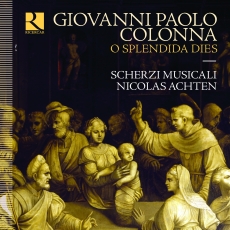Scherzi Musicali - O splendida dies - American Record Guide
Although Giovanni Paolo Colonna (1637-95) is very closely associated with the vast San Petronio Basilica in Bologna—he was organist and maestro di cappella there—ensemble director Nicolas Achten makes the wise decision to record these chamber-scale motets in a smaller place with a smaller organ. That allows him to set quick tempos and employ an exhilarating vocal breathlessness to animate these seven motets for 2 or 3 voices from Colonna’s Opus 3 of 1681. Let me explain my use of the word “breathlessness”: it’s not at all a lack of breath, but rather an eager and impatient happiness to deliver a message through singing. As a listener I shared the sheer joy of it all, feeling as if the singers simply can’t wait to share news with someone they care about. The message is too important to be delayed. The five instrumental pieces here not only serve as prefaces to the motets and ways for us to enjoy skillful playing on a range of instruments, but also as a way to allow the listener to catch his breath before the next motet. For instance, Arresti’s Sonata XVI (with a gentle melody played on soprano lute) sits between the scarcely-contained exuberance of ‘O Splendida Dies’ for soprano and baritone and the ecstatic soaring Marian homage of ‘Pulchra Es’ for two sopranos. Tempos are fast but never (quite) out of control. I hope that the detailed descriptions of performance practice decisions in the booklet essay by Nicolas Achten will be useful for other ensembles who will be motivated and energized by this recording to perform Colonna’s music themselves.

